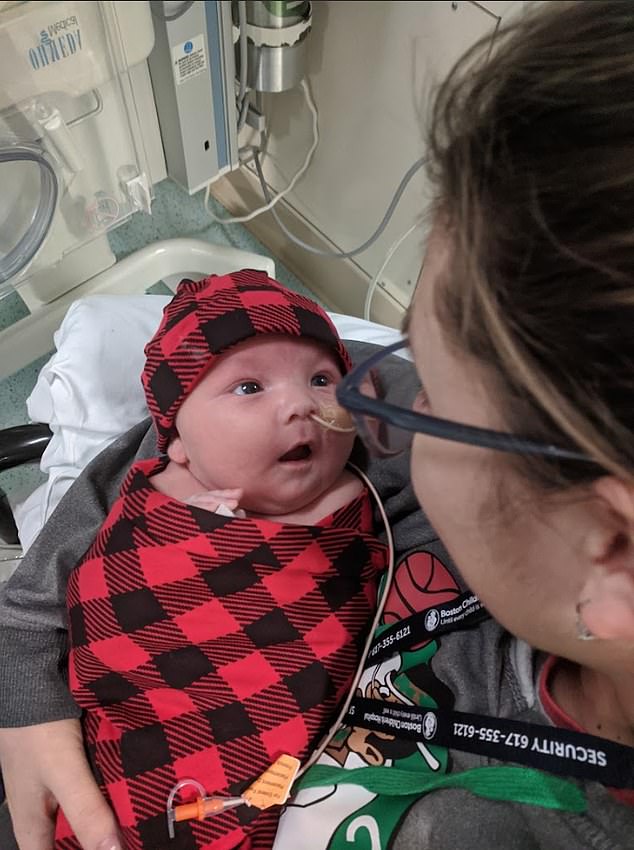A newborn has been diagnosed with a rare disease after his parents noticed he was having trouble breastfeeding just days after his birth.
Joe and Breanne Fusco of Massachusetts were thrilled to welcome their first child, Joseph Paul, in late 2019 after an uncomplicated pregnancy and delivery.
But on the day they were due to go home, Joseph was having trouble feeding and had not gained enough weight. He was taken to the NICU for tube feeding.
The next day she had a seizure and the family was transferred to Boston Children’s Hospital for more advanced care.
There, they discovered the baby had kidney damage, and doctors ran a series of tests that revealed Joseph had Lesch-Nyhan syndrome (LNS), a rare genetic disorder that affects about one in every 380,000 live births.
The “devastating” disease causes chronic kidney stones, loss of muscle control and self-harming behaviors such as head banging and biting in childhood, with patients typically succumbing to the disease by their 30s.
Joseph Paul Fusco’s parents noticed he was having trouble feeding after birth and doctors admitted him to the neonatal ICU.
Mr Fusco, a 33-year-old special education teacher, said: “We were heartbroken – it was one of the saddest and scariest days of our lives.
‘In an instant, our idea of what our family life would be like changed. It completely changed our perspective on parenting.
“There was so much confusion, fear, sadness and anger. We had never heard of LNS.
‘The geneticist gave us a printed summary that included what it was and the most common symptoms. The parts that caught our attention the most were reading that most patients with LNS do not walk and, of course, the self-harming behavior.
The father continued: “We were worried about what Joseph’s life would be like, how these symptoms would manifest in him and even how long we would have our baby.”
LNS affects almost exclusively boys and is caused by mutations in the HPRT1 gene.
This causes the body to not produce enough of an enzyme called hypoxanthine-guanine phosphoribosyltransferase (HGprt), leading to a buildup of uric acid, a waste product created by the body.
HGprt also plays a vital role in regulating purine, which is a chemical used to make DNA.
A deficiency of HGprt causes neurological problems such as difficulty speaking and walking, as some patients may experience involuntary twisting movements and spasms.
Eighty-five percent of patients with LNS experience self-injurious behaviors, which typically begin between two and three years of age.
Actions may include repeatedly biting the lips, fingers, and hands and repeatedly banging the head against hard objects.
Scientists aren’t exactly sure why LNS patients self-harm, but some… studies I have postulated that it could be because The condition causes damage to dopamine neurons in the brain, which can result in the patient being unaware that they have deficits.
The life expectancy of a patient with LNS is between 20 and 30 years.
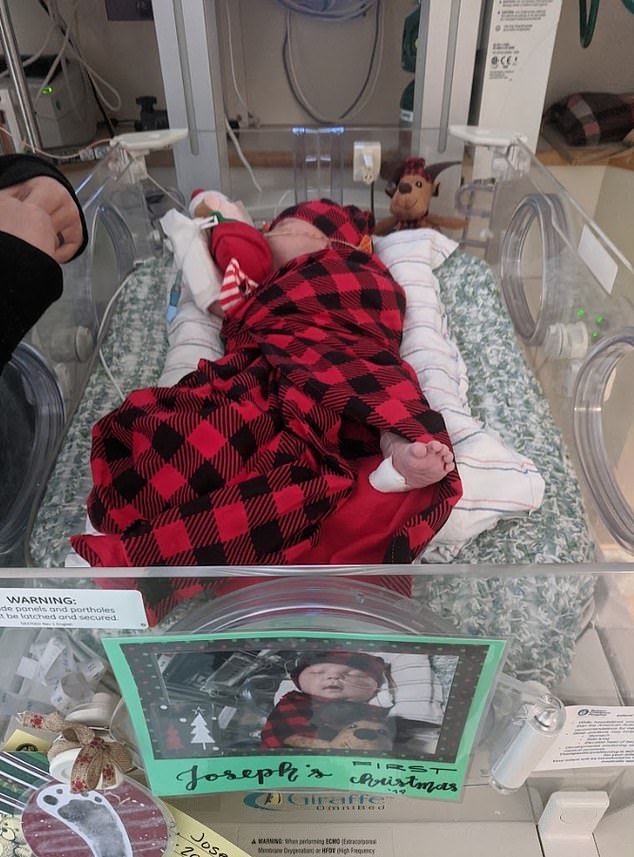
Joseph spent his first Christmas in the hospital after failing to gain weight and suffering a seizure.
The first sign that something was wrong with Joseph was something many newborns experience: The baby was having difficulty latching on to his mother’s breast and feeding properly, possibly because he was already suffering from the effects of LNS, which causes difficulty swallowing.
Due to her eating problems, she did not gain enough weight and the new family of three was not allowed to leave the hospital.
Joe said: ‘The hardest part was that we were all ready to leave the hospital together and go home as a family, and then on discharge day we were rushed to the NICU.
‘We felt a sinking, helpless feeling as we watched our son being hooked up to monitors and having a feeding tube inserted.
‘Then when she had a seizure, I remember standing in the parents’ room and crying.
‘Joseph had only been in this world for four days, and seeing everything he had to go through was truly heartbreaking for both of them.
During all this time in the hospitals, we felt scared, insecure and exhausted.
After spending a week over the Christmas break in the NICU, a geneticist broke the news to the new parents: their son had LNS.
Joe added: “We did our own research and were initially horrified because online research immediately gives you worst case scenarios and outcomes.”
LNS symptoms vary across the spectrum, with some cases being milder than others; Joseph’s falls somewhere between the mild and moderate end of the scale.
There is no cure for LNS, but treatment is given to control the symptoms and side effects of the disease.
Now four years old, Joseph can communicate verbally and physically, his kidneys remain healthy with the help of medication, and he shows no signs of self-harm.
But he is unable to walk on his own, as he uses a walker or wheelchair. His family has frequent appointments with doctors and service providers and equipment who work hard to help him.
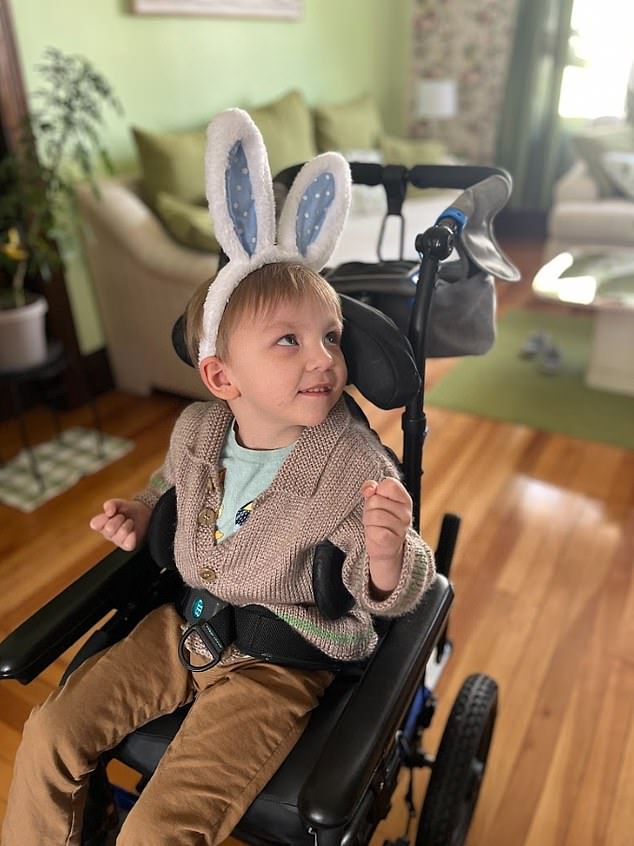
Joseph has Lesch-Nyhan syndrome (LNS), a rare genetic disorder that affects approximately one in every 380,000 live births.
Joe said: ‘Physically, the hardest obstacle to overcome has been his mobility issues.
‘Joseph uses a wheelchair and a walker to get around and his expressive language is delayed for his age.
‘He is able to put two or three words together at a time and is working on multi-syllabic words.
‘We’re currently in the “Why?” stage that most toddlers go through, where Joseph is constantly asking us why we’re doing something. It’s super fun!’
The father added: ‘On the other hand, his receptive language is on par with his same-age peers and has been since he was a baby.
‘He understands everything that is happening around him, but sometimes he needs help to get his message across.
Emotionally, it is difficult to watch other children Joseph’s age play independently while Joseph is dependent on the participation of others.
“He wants to be included in everything he sees other kids doing, but sometimes it’s just not possible.”
Despite his challenges, Joseph’s parents say he is happy and thriving: “We are so proud of how far Joseph has come despite LNS.
“We would like people to know that he is so much more than his diagnosis. He goes to school every day and constantly learns new things, and he never gives up.
‘He takes on every challenge, whether it’s walking with his walker, writing and coloring, or trying something new, all with determination and a big smile.
‘He loves to play and meet new people. He also has a great sense of humor and loves to laugh.
“In many ways, he’s a normal four-year-old. He just needs a little more help and support to be included.”
Although their future is unclear, the family is hopeful.
Joe added: ‘Some people with LNS live well into middle age, while others sadly pass away during their second decade of life.
‘Unfortunately, many patients with LNS are misdiagnosed at first and don’t really find out what it is until five or more years later in life.
“Fortunately, Joseph was diagnosed with LNS so early in his life that we have been able to treat him as effectively as possible for over four years, and we are hopeful that he will live a long and happy life.”
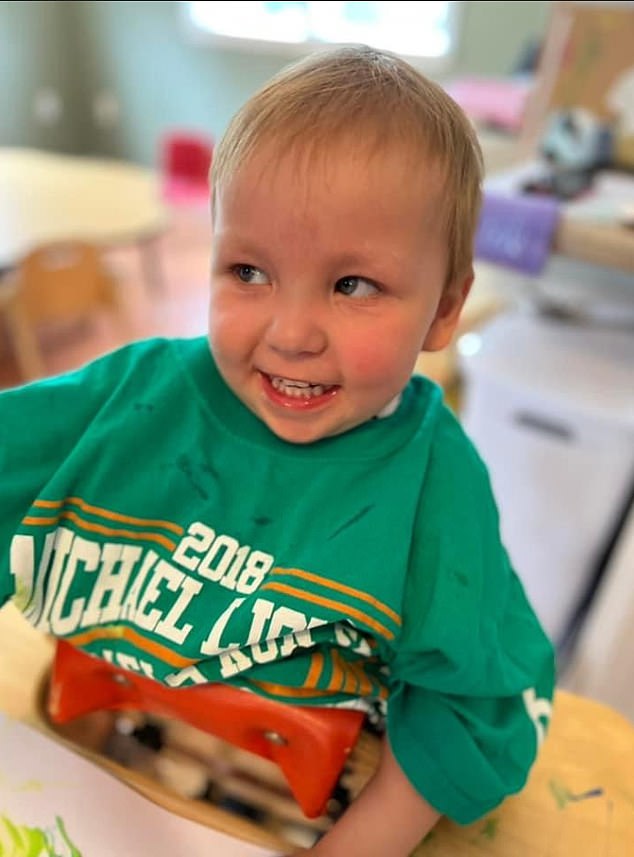
Joseph’s father Joe said: “In many ways he’s a normal four-year-old. He just needs a little extra help and support to be included.”
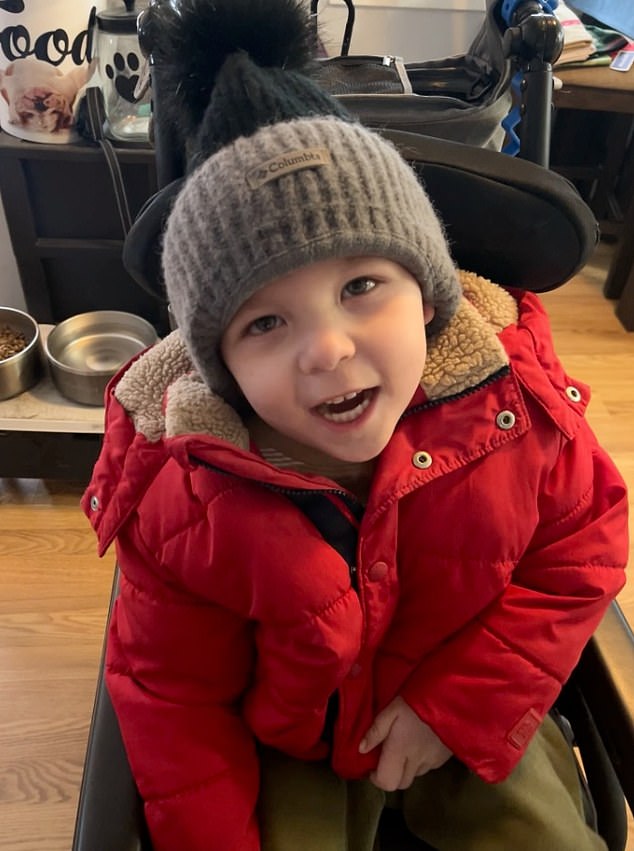
Joseph is unable to walk on his own and requires support when standing or using a wheelchair or walker.
The family shares Joseph’s journey on their Instagram @living_with_lnsand say they have found a deeper sense of community since being diagnosed.
And despite the “devastating” diagnosis, “it has brought out the best” in the family.
Joseph’s father said: ‘He has the most caring and loving grandparents, aunts, uncles and friends ever.
‘We have never needed help and it was not available, whether it was to transport us, collect medicine or help with equipment.
“It’s really amazing how something so bad can bring people so close together.”
Joe continued: ‘We’ve met some amazing people over the past four years and made some beautiful connections.
‘And we’ve learned to be the parents Joseph needs, not the ones we originally thought we would be.
“There are still days of sadness and anger, but they have become rarer as time has passed. Most of all, we feel lucky to be on this journey with Joseph.
“We are all incredibly grateful to have him in our lives, challenges and all.”


